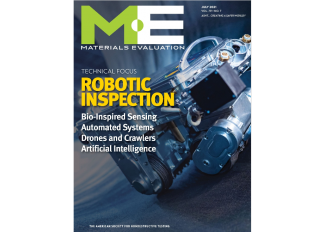A special July Technical Focus Issue of Materials Evaluation (ME) detailed three University-led research and development projects made possible through a partnership with NETL under the Crosscutting Research University Training and Research (UTR) program, which supports energy research at colleges and universities nationwide, including minority institutions. Each project advances robotics-based inspection in unique ways and serves to underscore how NETL is helping to investigate novel technologies that will become viable solutions to industry in the future.
NETL began collaborating with Florida International University (FIU), The Colorado School of Mines (CSM) and New Mexico State University (NMSU), through the “Automated Plant Component Inspection, Analysis, and Repair Enabled by Robotics” topic in the competitive 2018 UTR funding opportunity announcement (FOA). In recent years, each team has continued to advance their respective robotic-based inspection technologies.
The special ME issue, which was edited by NMSU project principal investigator Ehsan Dehghan-Niri, Ph.D., features technical papers describing each NETL-supported project in detail.
FIU (DE-FE0031651) developed a robotic inspection tool to evaluate the structural integrity of key components in power plants. The tool offers a way to internally inspect power plant superheater tubes, which are small in diameter, coiled and often stacked closely together, making external inspection difficult. FIU’s electrically powered pipe crawler can travel through these small tubes and assess their condition through various onboard sensors. The crawler prototype has been tested at laboratory scale, and the team continues to improve upon their design. Future iterations could provide power plant companies with a valuable tool to reduce costly failures in their systems.
CSM (DE-FE0031650) built prototype artificial intelligence (AI)-enabled robots capable of evaluating and repairing power plant boilers, ensuring safer and more affordable energy production. As the robots crawl along, they can employ a variety of nondestructive testing (NDT) sensors to perform real-time inspection of boiler furnace walls. If the robots sense a crack, they can then operate welding devices to make an immediate repair, all while using AI to enable smart data analysis. CSM continues to work on their design, and future versions of the CSM robots will limit or eliminate the need to send inspectors to assess difficult-to-access or hazardous areas, leading to increased boiler reliability, usability and efficiency as well as power plant safety.
NMSU (DE-FE0031649) took cues from wildlife to create a new generation of autonomous robots to monitor and inspect vital energy and civil infrastructure. The resulting design is a versatile, lizard-inspired tube inspector (LTI) robot with embedded non-contact ultrasound sensing that allows for crack and corrosion detection of components. With the ability to move on a variety of surfaces, the LTI robot overcomes many obstacles that impede other robots. The team plans to further expand the robot’s ability to move so that it can also climb vertical tubes.
“The automated evaluation technologies highlighted in the ME special issue are just a few examples of how we use the UTR program to explore new ideas and prove the feasibility of emerging concepts,” said Sydni Credle, technology manager for University Training and Research at NETL. “These projects represent innovative ways in which robotics technologies can be used to provide advanced warning of operational issues and also ensure the integrity and reliability of low-carbon energy systems. They have a broad applicability to different types of fuel-flexible combustion systems including biomass, syngas, waste, hydrogen and co-fired fuels, which makes these research efforts very relevant and impactful. Special recognition by this ME journal publication for these research efforts just reinforces the fact that these teams are looking at real-world problems and finding solutions that are of high interest to industry.”
Materials Evaluation is the American Society for Nondestructive Testing’s flagship journal with news and features covering all aspects of NDT and the NDT industry. The technical content in ME is peer-reviewed by qualified technicians and researchers, ensuring quality details and discussion. The journal’s history and archive reach back to the earliest formative days of the Society.
These project partners also recently conducted project briefings as a part of the 2021 Crosscutting Research Sensors & Controls Project Review Meeting. Presentations from the event are archived online in NETL’s Conference Proceedings.
NETL is a U.S. Department of Energy national laboratory that drives innovation and delivers technological solutions for an environmentally sustainable and prosperous energy future. By leveraging its world-class talent and research facilities, NETL is ensuring affordable, abundant and reliable energy that drives a robust economy and national security, while developing technologies to manage carbon across the full life cycle, enabling environmental sustainability for all Americans.




